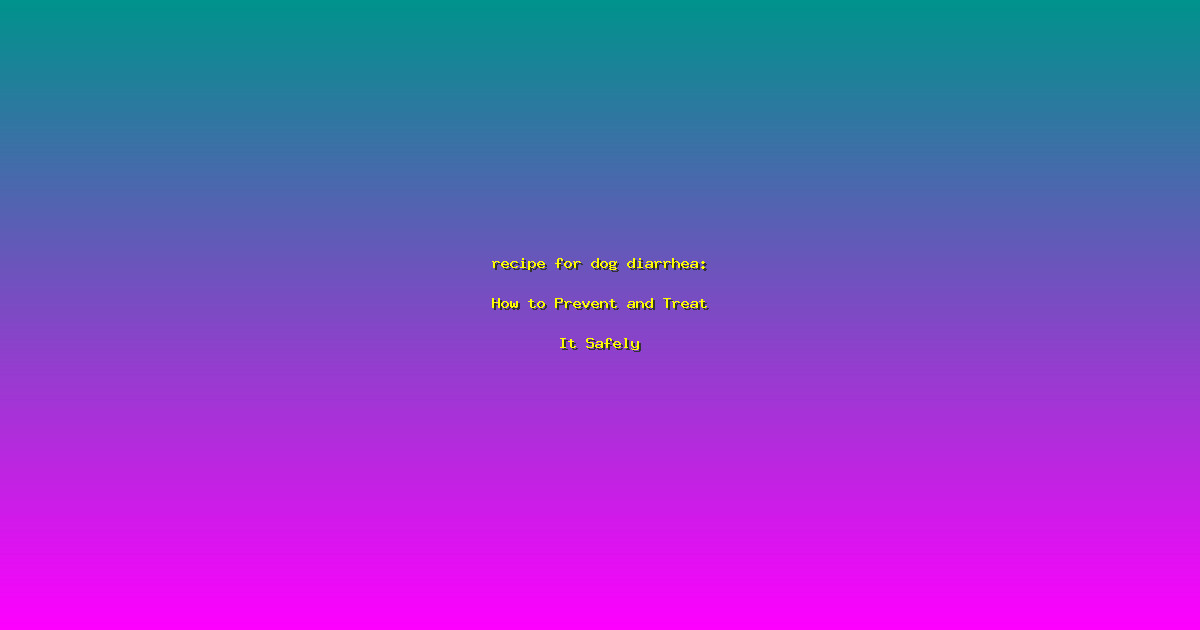recipe for dog diarrhea: How to Prevent and Treat It Safely
Every dog owner dreads the sight of their beloved pet suffering from diarrhea. Not only is it uncomfortable for your furry friend, but it can also be a sign of underlying health issues. The good news is that with the right recipe for dog diarrhea prevention and treatment, you can help your pet feel better and prevent future occurrences. In this article, we’ll explore the causes, symptoms, and solutions to keep your dog healthy and happy.
Understanding the Causes of Dog Diarrhea
Diarrhea in dogs can be caused by a variety of factors, including dietary indiscretion, infections, parasites, and even stress. According to the American Kennel Club, dietary indiscretion is one of the most common causes of diarrhea in dogs. This can include eating spoiled food, garbage, or even non-food items like socks or toys. Other common causes include bacterial infections, such as Salmonella or E. coli, and parasitic infections like Giardia or Coccidia.
- Dietary Indiscretion: Dogs are curious creatures and often eat things they shouldn’t. This can lead to upset stomachs and diarrhea. To prevent this, keep your dog away from garbage and ensure they only eat dog-safe foods.
- Infections: Bacterial and viral infections can cause severe diarrhea in dogs. Regular veterinary check-ups and vaccinations can help prevent these infections.
- Parasites: Parasites like Giardia and Coccidia can be contracted from contaminated water or soil. Regular deworming and fecal exams can help prevent parasitic infections.
Recognizing the Symptoms of Dog Diarrhea
Diarrhea in dogs can present with a range of symptoms, from mild to severe. Common symptoms include loose, watery stools, frequent bowel movements, and sometimes blood or mucus in the stool. It’s important to monitor your dog’s behavior and stool consistency to catch any issues early. If your dog is experiencing diarrhea, it’s crucial to determine the underlying cause to provide appropriate treatment.
- Mild Diarrhea: Mild diarrhea can often be treated at home with a bland diet and plenty of water. However, if symptoms persist for more than 24 hours, it’s important to consult a veterinarian.
- Severe Diarrhea: Severe diarrhea, especially if accompanied by vomiting, lethargy, or blood in the stool, requires immediate veterinary attention. These symptoms can indicate a more serious condition that requires professional treatment.
- Preventive Measures: Regular veterinary check-ups, proper diet, and parasite prevention can help prevent diarrhea in dogs. Keeping your dog up-to-date on vaccinations and deworming can also reduce the risk of infections and parasites.
Recipe for Dog Diarrhea Prevention and Treatment
Preventing and treating dog diarrhea involves a combination of dietary management, proper care, and regular veterinary check-ups. Here are some practical steps you can take to keep your dog healthy:
- Bland Diet: If your dog is experiencing mild diarrhea, a bland diet can help. This includes feeding your dog boiled chicken and rice for a few days. This diet is easy to digest and can help soothe the digestive system.
- Hydration: Keeping your dog hydrated is crucial when they have diarrhea. Offer small amounts of water frequently to prevent dehydration. You can also give your dog electrolyte solutions designed for dogs to help replenish lost fluids.
- Veterinary Care: If your dog’s diarrhea persists or is accompanied by other symptoms, it’s important to seek veterinary care. A veterinarian can diagnose the underlying cause and provide appropriate treatment, which may include medications or further diagnostic tests.
Frequently Asked Questions
Can I give my dog over-the-counter medications for diarrhea?
It’s important to avoid giving your dog over-the-counter medications without consulting a veterinarian. Many human medications can be toxic to dogs and may worsen the condition. Always consult a veterinarian before administering any medication to your dog.
How can I prevent my dog from eating non-food items?
To prevent your dog from eating non-food items, keep your home and yard free of potential hazards. Store garbage securely, and supervise your dog when they are outside. Training your dog to follow commands like “leave it” can also help prevent them from eating inappropriate items.
What should I do if my dog’s diarrhea is accompanied by vomiting?
If your dog is experiencing diarrhea and vomiting, it’s important to seek veterinary care immediately. These symptoms can indicate a more serious condition, such as a blockage or infection, that requires professional treatment. Do not attempt to treat this at home; seek professional help.
Is it safe to feed my dog human food?
While some human foods are safe for dogs, others can be harmful. Foods like chocolate, grapes, and onions are toxic to dogs and can cause serious health issues. Stick to dog-safe foods and consult your veterinarian before introducing any new foods into your dog’s diet.
How often should I take my dog to the vet for check-ups?
Regular veterinary check-ups are crucial for maintaining your dog’s health. Puppies and senior dogs should visit the vet more frequently, typically every 6 months. Adult dogs should have annual check-ups to ensure they are healthy and up-to-date on vaccinations.
Conclusion
Preventing and treating dog diarrhea is essential for your pet’s health and well-being. By following the recipe for dog diarrhea prevention and treatment, you can help your furry friend feel better and prevent future occurrences. Remember, regular veterinary care, a balanced diet, and proper hygiene are key to keeping your dog healthy. If you suspect your dog has diarrhea, don’t hesitate to seek professional help. Your dog’s health is in your hands, and with the right care, you can ensure they live a long, healthy life.
